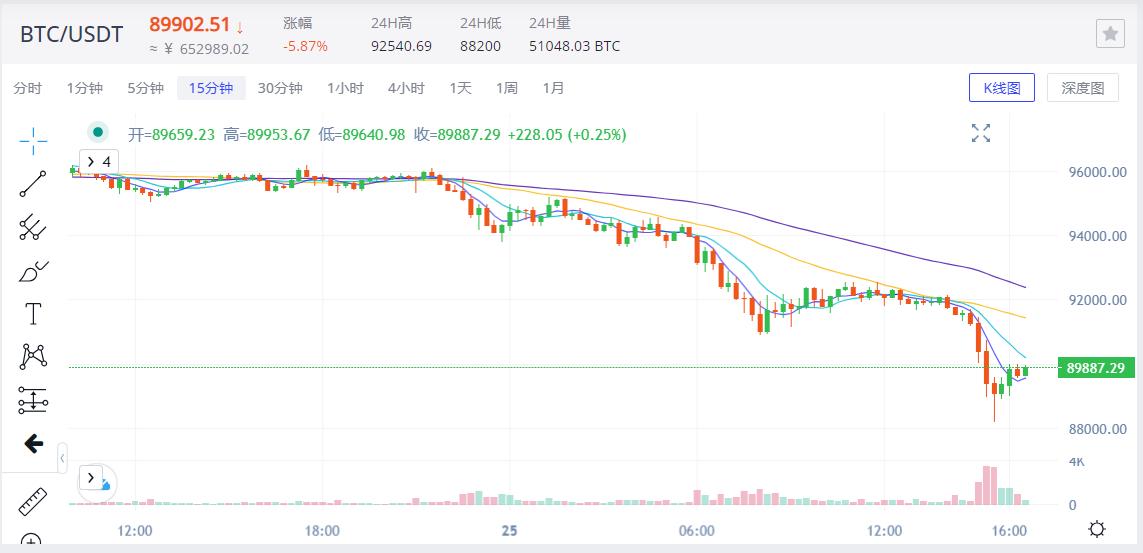The crypto market was hit hard again, with Bitcoin falling below the $90,000 mark, down 6.2% in 24 hours, a new low since mid-November. The altcoin market was even more bloodbathed, with the two leading stocks ETH and SOL falling below $2,400 and $140 respectively, down 11% and 14.88% in 24 hours. Investors' confidence was hit hard, with the Fear and Greed Index falling from 49 to 25 today, entering the "extreme panic" state again after 5 months.

Technology stocks led the crypto market to collapse
According to media reports, Microsoft, the biggest supporter of OpenAI, has canceled the lease of some AI data centers. The market speculates that Microsoft may be giving up "Stargate" and is worried that AI infrastructure may face the risk of oversupply. In addition, Trump's claim that tariffs on Canada and Mexico will continue further hit market confidence, and large technology stocks in the US stock market fell collectively. Due to the strong correlation between Bitcoin and technology stocks, Bitcoin has fallen sharply under the drag of US stocks.
Meanwhile, lawmakers in the South Dakota state legislature delayed a vote that could have allowed bitcoin investment in the state, effectively killing the bill. South Dakota, a relatively small state, has a significant impact on the global bitcoin market through its legislative decisions, but the failure of its bill has been magnified by the market as a symbol of bitcoin acceptance, which could trigger a broader psychological effect and further depress market sentiment.
Will it continue to fall?
The market is confusing, and many senior people have expressed their views on the future market trend. Most analysts firmly believe that this is just a phased correction in the bull market process, emphasizing that every bull market has experienced a large price adjustment of more than 50%, and the market has maintained an upward trend since then. BitMEX co-founder Arthur Hayes has been bearish since January. This time he gave another analysis, confident that the price of Bitcoin will fall to $70,000, returning to the starting point of the Trump market.
Compared with Bitcoin, which is gradually moving away from retail investors, the market is most concerned about the two major altcoin leaders, ETH and SOL. Earlier, there was news in the market that Bybit needed to repurchase ETH to replenish wallet funds. This expectation pushed the ETH price to rebound significantly at the time, but yesterday it was reported that it had successfully filled the funding gap of ETH through loans, over-the-counter transactions and other means, and the potential buying has been eliminated. This undoubtedly adds great uncertainty to the price trend of ETH.
SOL's recent performance has been sluggish. The collapse of LIBRA revealed a meme conspiracy group controlled by institutions, which completely overturned the public's original perception of fair meme launches, severely hit market confidence, cooled meme momentum, and SOL's "golden shovel" attribute dropped significantly. In addition, SOL will usher in a large-scale auction unlocking. Many holders choose to temporarily leave the market and wait and see for risk avoidance reasons, which undoubtedly further increases the pressure on SOL's price to fall.
In general, the current market sentiment is still shrouded in pessimism, and prices continue to fall and have not shown signs of stopping the decline and stabilizing. Any disturbance may cause market fluctuations beyond expectations. Under the uncertain market conditions, many investors have changed their investment strategies, from the aggressive pursuit of high risks and high returns to the steady pursuit of certain returns. Holding U financial management has become the mainstream choice due to its relatively flexible and stable characteristics.













